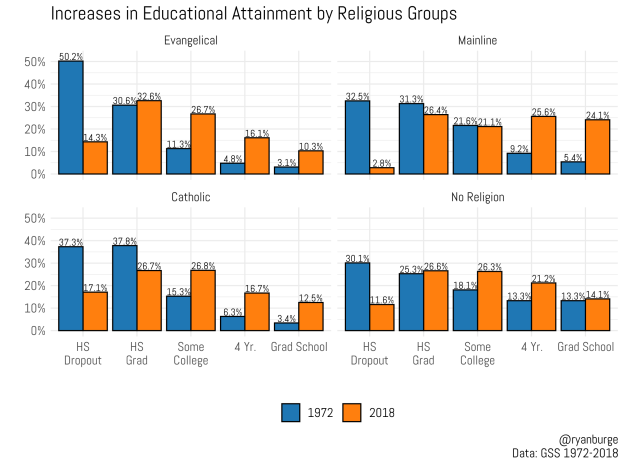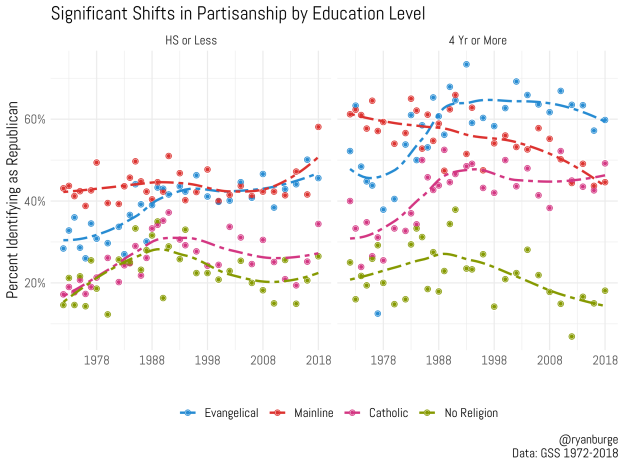by Ryan P. Burge, Eastern Illinois University
There may be some cracks emerging in the GOP-white evangelical alliance that has seemed to dominate American politics since the 1980’s. It’s not based on any sort of specific policy, but anyone who follows the machinations of evangelical politics can see the beginnings of a rift beginning to form. Mark Galli’s editorial at Christianity Today entitled, “Trump Should Be Removed from Office,” laid a lot of it bare. There’s clearly an elite class of evangelicalism that reads Christianity Today and, while they are predominantly Republican in orientation, they are not gung-ho for Donald Trump. They aren’t that large, but they are vocal. However, this group is dwarfed in size and political power by the rest of white evangelicals who decried Galli’s editorial and back the Republican Party’s politics, no matter what.
Sometimes the difficulty in social science is trying to quantify something that you feel is true, but is hard to measure. I think I have found a decent proxy measure of these two factions in American evangelicalism – level of education. While obviously it’s not a perfect sorting mechanism, it stands to reason that a vast majority of the thought leaders in evangelicalism are those with advanced levels of education.
Before getting into politics, it’s important to get a good sense of just how much education has accelerated in this country among different religious groups. I calculated the share of the three major Christian traditions (evangelical, mainline, and Catholic) as well as the “nones” at each level of education in both 1972 (the first year of the GSS), and 2018.

In 1972, just 7.9% of all evangelicals had a four-year college degree. Today, that share has more than tripled to 26.4%. Despite the fact that evangelicals have made huge strides in educational attainment, they are still far behind other religious groups. For instance, while just 14.6% of mainline Protestants had a four-year degree in 1972, it’s now jumped to fully half of the tradition (49.7%) – that’s double the rate of evangelicals. In 2018, Catholics also have somewhat higher levels of college education (29.2%) compared to evangelicals, as do those without a religious affiliation (35.3%). So, while there have been gains among evangelicals, they have been modest.
But do these highly-educated evangelicals have a different view of the political world than evangelicals without bachelor’s degrees? I broke the previous four samples into those with a high school diploma or less and those with a four year college degree or more and calculated the share who identify as a Republican since 1972. That is visualized below.

There are lots of shifts that are worth discussing. For instance, just 30% of evangelicals with low levels of education were Republicans in 1972 – now it’s 46%. Compared to the other three religious groups, there has been a lot less shifting among the less educated. For mainline Protestants, it’s been just an eight point shift, with similar results for Catholics. For those without a religious affiliation, the move is more modest at just about five percentage points.
The right panel tells an interesting story about education, religion, and partisanship. For instance, while 60% of mainline Protestants with a college degree were Republicans in 1972, there has been a slow slide away from the GOP since that point, a move that has only accelerated in the last decade. Now, just 45% of college educated mainline Protestants are Republicans. Among Catholics there was a rapid move toward the GOP from 1972 to 1993 – the total shift was almost twenty percentage points. However, that movement stopped and college educated Catholics are just as Republican today as they were when Bill Clinton took office.
The college-educated evangelical trend looks similar to what happened with Roman Catholics. Note that the line jumps up rapidly from 1980 to 1990, when there was a fifteen point shift toward the Republicans. In much the same way as Catholics, evangelicals then stalled out. However, the baseline is much higher for evangelicals at just about 65%, which is twenty points higher than Catholics. But then something small, but noticeable occurred. Highly educated evangelicals have been moving away from a Republican affiliation. While it’s just two data points, it’s worthwhile to point out that since 2016, the share of college educated evangelicals who identified as Republicans dropped below 60% for the first since 1998. This may be ever-so-slight evidence of a weakening of the ties among elite evangelicals and the GOP.
But, I wanted to investigate that a bit more. Is that small move a result of the election of President Trump, or just a general defection from Republican principles? The 2018 CCES asked a job approval question about Donald Trump just after the 2018 midterm elections. I broke that down among the four religious groups previously used as well as into six levels of education. The share that approves of his job performance are displayed in the heatmap below.

Obviously, evangelicals as a whole are the most supportive of Donald Trump, while the religiously unaffiliated don’t approve of how the President is doing his job. But moving from the left side of the heatmap (those who didn’t graduate from college) to the right side (those with a graduate level education) portrays an interesting story.
Among both Catholics and mainline Protestants, the level of education that is the most “Trump friendly” are those with a two year college degree. For evangelicals, it is those who have completed some college, but not an associate’s degree. This does make sense at some level. These are the type of people who likely work in blue collar jobs often in a skilled trades profession, but are not at the level of a white-collar or management worker.
However, notice that on the right side of the graph there is a clear drop off among those with a graduate level degree versus those with a bachelor’s degree. Trump approval among evangelicals with graduate level work drops nearly ten percentage points, which is similar to the decline among mainline Protestants (11.5%). The decline among Catholics is more modest at just 5.2%. So, yes, it does appear that there is some negative Trump sentiment among the most educated evangelicals. That may be driving a small level of defection from the GOP as seen in the General Social Survey data.
It’s important to not oversell these findings. A majority of evangelicals with a graduate degree still give Donald Trump positive marks on his job performance. But, it does help to explain some of the division that seems to be occurring among evangelicals in the United States. Clearly, rank and file evangelicals are still in lockstep with the Republican Party and its standard bearer, Donald Trump. But, it seems that the election of Trump was a step too far for those evangelicals with a higher level of education. Recall that just one quarter of all evangelicals have a college degree in 2018, but that number will likely grow. As that share rises, and the GOP keeps pinned to the right, then the likelihood of a larger share of evangelicals defecting from the Republican Party becomes a stronger possibility in each subsequent election cycle.
Ryan P. Burge teaches at Eastern Illinois University in Charleston, Illinois. He can be contacted via Twitter or his personal website. The syntax for this post can be found here.

[…] Also from the increasingly indispensable Religion in Public blog: what education has to do with one crack emerging in the Trump-evangelical […]
LikeLike